

Immune system analogy video. Immune system - animated. Crash Course: Immune System Part 1. Crash Course: Immune System Part 2. Crash Course: Immune System Part 3. Overview of the Immune System. The Immune System - Bozeman Science. Human Physiology - Immune System Hormone. The Immune System: Running as Preventative Medicine - Sports Science: Running. What causes antibiotic resistance? - Kevin Wu. The effect of exercise on immune function. Adam Persky, Andrew Doyle, Chris Martens, Dennis Ryan Introduction The medical world has made great advances in treatments relating from high blood pressure to HIV and cancer.
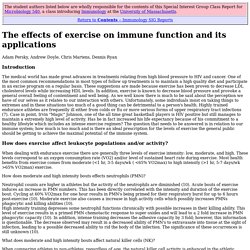
One of the most common recommendations in most types of follow up treatments is to maintain a high quality diet and participate in an excise program on a regular basis. These suggestions are made because exercise has been proven to decrease LDL cholesterol levels while increasing HDL levels. In addition, exercise is known to decrease blood pressure and provoke a general overall feeling of contentment and well being. Overtraining effects on immunity and performance. Immunology and Cell Biology (2000) 78, 502–509; doi:10.1111/j.1440-1711.2000.t01-7-.x Top of page Introduction Overtraining is a process of excessive exercise training that may, if left unchecked, lead to a condition termed 'overtraining syndrome'.
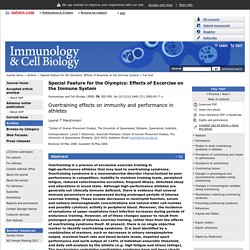
Athlete's guide to the immune system. Something has gone wrong.
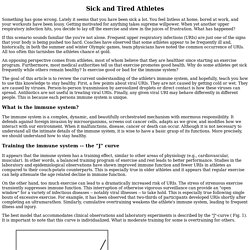
Lately it seems that you have been sick a lot. You feel listless at home, bored at work, and your workouts have been lousy. Getting motivated for anything takes supreme willpower. When yet another upper respiratory infection hits, you decide to lay off the exercise and stew in the juices of frustration. What has happened? Chronic stress puts your health at risk - Mayo Clinic. Chronic stress puts your health at risk Chronic stress can wreak havoc on your mind and body. Take steps to control your stress. By Mayo Clinic Staff Your body is hard-wired to react to stress in ways meant to protect you against threats from predators and other aggressors.
Such threats are rare today, but that doesn't mean that life is free of stress. An interconnection between the nervous and immune system: Neuroendocrine reflex triggers infections. A newly-discovered reflex arc mediates a process which leads to a disruption in the hormones secreted by the adrenal glands which, in turn, results in an increased susceptibility to bacterial infections.
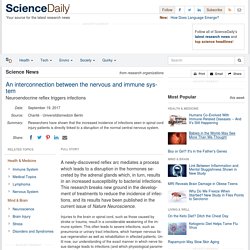
This research breaks new ground in the development of treatments to reduce the incidence of infections, and its results have been published in the current issue of Nature Neuroscience. Injuries to the brain or spinal cord, such as those caused by stroke or trauma, result in a considerable weakening of the immune system. This often leads to severe infections, such as pneumonia or urinary tract infections, which hamper nervous tissue regeneration as well as rehabilitation in affected patients. Until now, our understanding of the exact manner in which nerve tissue damage leads to infections (and which physiological parameters are responsible) has remained rudimentary at best. Under the leadership of PD Dr. Boundless Anatomy and Physiology. Types of WBCs The different types of white blood cells (leukocytes) include neutrophils, basophils, eosinophils, lymphocytes, monocytes, and macrophages.
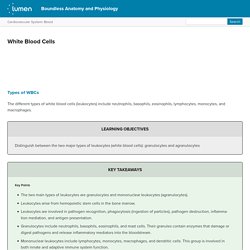
Learning Objectives Distinguish between the two major types of leukocytes (white blood cells): granulocytes and agranulocytes. Formation of Blood Cells - Blood Disorders - MSD Manual Consumer Version. Effects of Hormone Therapy on the Immune Systems of Postmenopausal Women With Chronic Infections. A type of eligibility criteria that indicates whether people who do not have the condition/disease being studied can participate in that clinical study.An arm type in which a group of participants receives an intervention/treatment considered to be effective (or active) by health care providers.An unfavorable change in the health of a participant, including abnormal laboratory findings, that happens during a clinical study or within a certain amount of time after the study has ended.
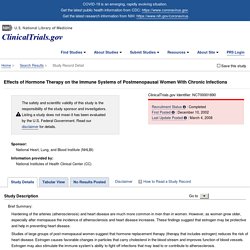
This change may or may not be caused by the intervention/treatment being studied.A type of eligibility criteria that indicates the age a person must be to participate in a clinical study. This may be indicated by a specific age or the following age groups:The age groups are: Child (birth-17)Adult (18-64)Older Adult (65+)A measure of all deaths, due to any cause, that occur during a clinical study.A method used to assign participants to an arm of a clinical study. Autoimmune Diseases: Types, Symptoms, Causes, Diagnosis & More. What is an autoimmune disease?
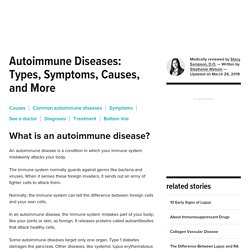
An autoimmune disease is a condition in which your immune system mistakenly attacks your body. The immune system normally guards against germs like bacteria and viruses. When it senses these foreign invaders, it sends out an army of fighter cells to attack them. Normally, the immune system can tell the difference between foreign cells and your own cells.